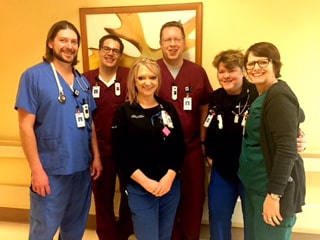
[vc_row][vc_column][vc_column_text]Earlier this week I had the pleasure of presenting at The Beryl Institute’s PX2017 Conference in Denver. As an added bonus, it was a far cry from skiing weather with temperatures reaching an unseasonably balmy 80 degrees during the week!
I’ve had the privilege of presenting at past conferences for The Beryl Institute but this time was different. This time I was accompanied by two wonderful colleagues and talented nurses, key people in our work at Regions Hospital: Richelle Jader (Emergency Department Director) and Daisy Nelson (Charge Nurse and Staff Nurse). We shared about our journey together at Regions Hospital’s Emergency Department in a session entitled “The Unexpected Experience.” The reason I want to share about this in this series is that this work, and the Beryl session, was truly led by frontline staff.
When DTA was engaged by the leadership team at the Regions Hospital ED, we quickly formed a frontline interdisciplinary team that informed and led the work. This team taught me a lot and challenged many of my assumptions going in. For example, I didn’t intend to cover anything about the payment mechanisms related to patient experience – I didn’t think that frontline staff in the ED would care about value-based purchasing. Daisy was the first nurse who spoke up and challenged this. She pointed to a Value-Based Purchasing video that we’d shared with the team and thought that everyone should understand that there’s a financial element at stake for the hospital as well. This was ultimately shared in each of the Unexpected Experience workshops that the staff created.
Another example of assumptions challenged was that the leadership team at Regions ED and our team at DTA anticipated that we’d incorporate simulation into the training workshop. In fact, Regions Hospital has a terrific simulation lab at the department’s disposal! However, we heard loud and clear from the staff – again some of the top nurses, doctors, and techs – that the department was just “simmed out!” There had been a recent 8-hour training on mental health and de-escalation that everyone was attending in the Sim Lab. So, we got creative!
One of the physicians on the team suggested that the value of a simulation was not so much in the acting but more in watching their colleagues in action and seeing care practices play out in various situations with patients. So, the team created an improv outline and incorporated every role in the ED as they interacted with a patient: EMTs, coordinators, nurses, techs, residents, staff physicians, security, etc. This led to a video that was filmed from a patient and her family’s perspective. The team worked tirelessly to ensure that each role did things well (smile, wash their hands, use the patient’s name, ask permission, use humor, make a social connection) and did some things not so well (forget to narrate their care, call the patient “hon”, neglect to address duration). As you can imagine, it was difficult for these gifted caregivers to act in a way that was so contrary to their usual behavior, however, the result was excellent! There was even a bit of humor which the audience caught and helped to drive some of the points home.
Another thing the interdisciplinary frontline team did was make sure that we engaged the audience. For the video simulation activity, the team had the great idea to make it a competition where everyone was given a sheet and asked to write down as many positive care practices they witnessed, as well as the opportunities for improvement they identified. We facilitated a discussion after each scene in the video and then collected the sheets and counted who saw the most care practices in action. The winner got a chocolate bar (full sized!).
This activity in the Unexpected Experience workshop also served another purpose which we hadn’t originally intended: it helped us identify staff who might be good care team coaches. It became evident that those who could identify 28 different care practices in a 5 to 6-minute scene might also be keen observers and coaches of their peers in the department. As a result, we trained 11 staff to become coaches from the department.
Perhaps one of my favorite parts of working with this frontline team was that they were so much fun! They were honest with us and would say things like “ED people are competitive, they remember things that are humorous, and they like candy.” So, we made sure to include each of these elements in the workshop! We had some trivia and other activities where candy was a prize. When discussing the importance of duration and addressing patients’ concerns about waiting, we not only drew on the work of Dr. David Maister [1] but also from the wit and wisdom of Jerry Seinfeld. (As an aside, the team wanted to use portions of a clip from Amy Schumer calling the cable company but the corporate firewall blocked it every time!)
The results of this team’s work, and moreover their sustainment of those results in the department long after our DTA team had left, are truly something to be proud of. But enough of me telling you about it! You can download the full case study about the Regions ED and learn about their tremendous success there.
Check back with us next time when we’ll explore another key aspect for frontline staff that makes a difference to patients!
[1] Maister, D. (1985). The Psychology of Waiting Lines. In J. A. Czepiel, M. R. Solomon & C. F. Surprenant (Eds.), The Service encounter: managing employee/customer interaction in service businesses. Lexington, MA: D. C. Heath and Company, Lexington Books.
Photo credit: Amy Krum[/vc_column_text][vc_btn title=”Click to Download Case Study” color=”green” link=”url:http%3A%2F%2Fdtasolutions.gwstandard.wpengine.com%2Fed-improvement-case-study-registration%2F|||”][/vc_column][/vc_row]
